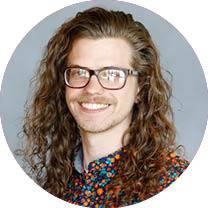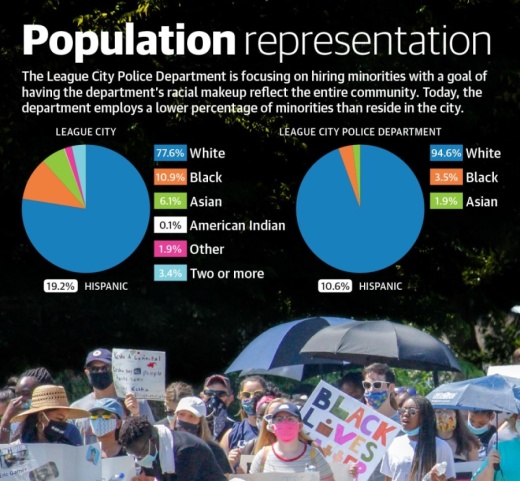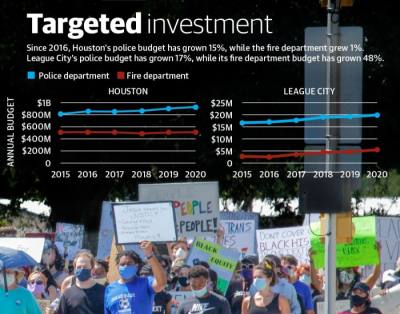“I know what it’s like to face injustice as a Black man,” he said. “To see people of all ethnicities here, it really shows we’re making progress, but we do still have a long way to go.”
A late-May video of native Houstonian George Floyd’s death in Minneapolis police custody spurred nationwide protests such as the one in Houston and a few in League City and the Bay Area seeking justice and police reform.
Less than a week later, another demonstration called on Houston City Council members to delay a vote on the city budget and reallocate some, if not all, of the proposed $964 million set aside for the police department to social services aimed at addressing poverty and mental illness.
Over the sounds of protesters’ chants outside City Hall, council members voted unanimously to approve the budget without any changes to police funding. City leaders instead pushed for a different strategy, choosing to focus on task forces, committee meetings and other public input processes before implementing any widespread reforms.
The response has not been as severe in League City, but still, the City Council has indicated they have no intention of defunding the police.
However, that does not mean the city was not affected by Floyd’s death. League City police Chief Gary Ratliff said the department is going to continue de-escalation, use-of-force, race and bias training while recognizing there is room for improvement.
“Could we be better? We’re always searching for ways to become better,” Ratliff said. “We’re always looking for ways to improve what we do.”
A protest took place locally in the Bay Area as well in mid-June. Durshun Shah, Hannah Kuecker and Layla Vital, all rising seniors at Clear Springs High School, organized a peaceful protest against police brutality and inequality on the afternoon of June 14. Nearly 300 people of all ages attended, Vital said, including League City Mayor Pat Hallisey and U.S. District 14 candidate Adrienne Bell. The students’ goal was to encourage their peers to pay attention to social issues and understand the importance of taking action locally.
The group chose to start and end the demonstration at their high school, Shah said, because they want to see more discussions about race and inequality happening in the district’s schools.
“I hope that we’re going to get the ball rolling talking about this,” Vital said. “I just hope it sparks more empathy for the issues people of color have to go through.”
The group spoke at a League City City Council meeting June 9. Kuecker said they have formed a loose agenda, including goals related to making local education more inclusive and transparent. Police reform is also at the top of their agenda; Kuecker said they would like to see the basic tenets of the proposed Justice in Policing Act of 2020 applied in League City, regardless of what happens with the bill at a federal level.
Ratliff said he was upset by the video of Floyd’s death, in which a former Minneapolis police officer pinned Floyd by the neck until he died.
“We’ve been training our officers for years on how to mitigate positional asphyxia,” Ratliff said. “The death of this individual should never have occurred and wouldn’t have occurred in this department.”
Ratliff said everyone around the country has different viewpoints on how to improve policing because there are varying levels of accountability between police departments and the communities they serve.
“This situation breaks everybody’s heart. It caused a lot of folks to check their faith in the police, and I understand,” Ratliff said. “[But] everybody’s not the same. Every department should be judged on and handled by their own accord and not by the actions of other departments.”
One thing not previously covered in the department’s policies is the use of chokeholds. As a result of Floyd’s death, the department put language in its policies to indicate officers are not allowed to use chokeholds to restrain suspects except in the rare circumstances deadly use of force is authorized to neutralize a threat.
Houston’s reforms have included the commitment to establish a website for residents to file complaints against Houston police officers and an executive order by Mayor Sylvester Turner restricting certain use-of-force tactics as well as banning no-knock raids without written permission from the police chief. For nonemergency calls, the Houston Police Department has homeless outreach and mental health response teams, roles some said could work better outside the police.
“There’s a lot of reasons to be upset over what happened in Minneapolis, but there’s probably ... no one more upset than the police agencies across the United States who have dedicated their lives to serving the citizens that they do and have an officer through negligence do something like that because that impacts all of that in a negative fashion,” Ratliff said.
The overwhelming majority of the department’s officers are white, but Ratliff hopes to see that shift. The department makes an effort to recruit people of color through local colleges with minority populations, surrounding police academies and other statewide efforts, Ratliff said.
If residents ever have an issue with a League City officer, Ratliff encouraged them to file a formal complaint. When an officer violates public trust, no one wants them gone more than the department’s other employees, Ratliff said.
Colleen Ferguson and Emma Whalen contributed to this report.






